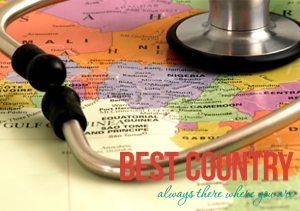Health in Nigeria

Health infrastructure
The federal government's role is mostly limited to coordinating the affairs of the university teaching hospitals, Federal Medical Centres (tertiary health care) while the state government manages the various general hospitals (secondary health care) and the local government focus on dispensaries (primary health care), which are regulated by the federal government through the NPHCDA.
The total expenditure on health care as % of GDP is 4.6, while the percentage of federal government expenditure on health care is about 1.5%. A long run indicator of the ability of the country to provide food sustenance and avoid malnutrition is the rate of growth of per capita food production; from 1970–1990, the rate for Nigeria was 0.25%.[4] Though small, the positive rate of per capita may be due to Nigeria's importation of food products.
Health insurance
Historically, health insurance in Nigeria can be applied to a few instances: free health care provided and financed for all citizens, health care provided by government through a special health insurance scheme for government employees and private firms entering contracts with private health care providers. However, there are few people who fall within the three instances.
In May 1999, the government created the National Health Insurance Scheme, the scheme encompasses government employees, the organized private sector and the informal sector. Legislative wise, the scheme also covers children under five, permanently disabled persons and prison inmates. In 2004, the administration of Obasanjo further gave more legislative powers to the scheme with positive amendments to the original 1999 legislative act.
Cancer care
A new bone marrow donor program, the second in Africa, opened in 2012. In cooperation with the University of Nigeria, it collects DNA swabs from people who might want to help a person with leukemia, lymphoma, or sickle cell disease to find a compatible donor for a life-saving bone marrow transplant. It hopes to expand to include cord blood donations in the future.
Mental health
The majority of mental health services is provided by 8 regional psychiatric centers and psychiatric departments and medical schools of 12 major universities. A few general hospitals also provide mental health services. The formal centres often face competition from native herbalists and faith healing centres.
The ratio of psychologists and social workers is 0.02 to 100,000.
Water supply and sanitation
Water and Sanitation coverage rates in Nigeria are amongst the lowest in the world. Access to an improved water source stagnated at 47% of the population from 1990 to 2006, then increased to 54% in 2010. In urban areas access decreased from 80% to 65% in 2006, and then recovered to 74% in 2010.
Access to adequate sanitation decreased from 39% of the population in 1990, to 35% in 2010, with a particularly marked decrease in urban areas. 25% of Nigerians have to use shared sanitation facilities, which are not considered as adequate. 22% are estimated to use other inadequate facilities and another 22% are estimated to defecate in the open.
Adequate sanitation is typically in the form of latrines or septic tanks. General sewerage system is almost non-existent, as most home use septic tanks to dispose their human wastes. Except for Abuja and limited areas of Lagos, no urban community has a general sewerage treatment system. A 2006 study estimated that only 1% of Lagos households were connected to general sewers.